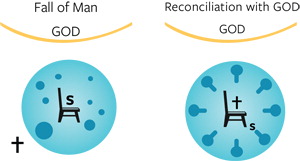As Christian stewards we must realize that in Christ "we live and move and have our being" (Acts 17:28). In this lesson, you will see the basis of God's claim on your life.
Jesus Christ created us (Colossians 1:16). He bought us with His precious blood (1 Peter 1:18,19). And God anointed Him as our Lord (Ephesians 1:20-23; Acts 10:36; Romans 10:12). Thus, the whole of our life - our personality, influence, material substance, everything - is His, even our success.

The Bible tells us that since Christ died for us, "those who live should no longer live for themselves but for him who died for them and was raised again" (2 Corinthians 5:15).
Not to acknowledge and act upon God's total ownership of everything we are, have, and will be is to rob ourselves of His blessing and make ourselves unfit for His service (2 Timothy 2:15,16,19-21).
Creation and Fall of Man
- After what pattern did God create man? (Genesis 1:26)
- Theologians have long debated just what it is that constitutes the image of God. That image seems to include the basic characteristics of personality; intellect, emotion, and will. Adam and Eve had intellect (Genesis 2:19), emotion (3:10), and will (3:6), just as God does.
What did man do to bring about separation between himself and God? (Genesis 3:1-7)
Note: This passage gives important insight into the character of sin. Adam did not get drunk, or commit immoral acts. He and Eve merely asserted their independence from God, rebelled against His command, and took control of their own lives. Sin is being independent of God and running your own life.
- How did the sin of man affect his: intellect (II Corinthians 4:2-4), emotions (Jeremiah 17:9), and will (Romans 6:20)?
- How did this act of rebellion affect the world? (Romans 5:12)
Reconciliation
- How did God bring us back and reconcile us to Himself? (Romans 5:8-10)
- What has God given us to enable us to live for Him? (John 14:26)
Our Responsibility
- God now has restored us to a position of fellowship similar to what Adam had. What does that declare about our present relationship with God? (I Corinthians 6:19-20)
- What, then, is to be our response to God? (Romans 12:1-2)
- Many people attempt to compromise and give God less than full allegiance. How did Jesus regard that practice in Matthew 12:30?
- In Revelation 3:15-16, how did Jesus describe His attitude toward those who will stand neither for nor against Him?
- What logical choice did Elijah present to the people? (I Kings 18:21)
If Elijah's logic is true, we must take one of two positions. If we determine that Jesus Christ is Lord and God, we must serve Him loyally. If He is not, He is an imposter and Christianity is obviously a hoax. If this were true, we should dissuade men from being Christians. It is one or the other! We must stand either with Christ or against Him, but never try to stand in between.
Life Application
- Read Isaiah 48:17-19. What blessings would you lose by going your own way and failing to recognize God's ownership?
- How much of your life are you willing for God to control? How much of it does He control?
- Is there something in your life that you have not surrendered to the control of your heavenly Father? What is it, and how will you now deal with it?
- What do you think God will do with your life if you surrender it all to Him?
Adapted from The 10 Basic Steps Toward Christian Maturity, by Bill Bright, co-founder of Campus Crusade for Christ. © Cru. All rights reserved.
